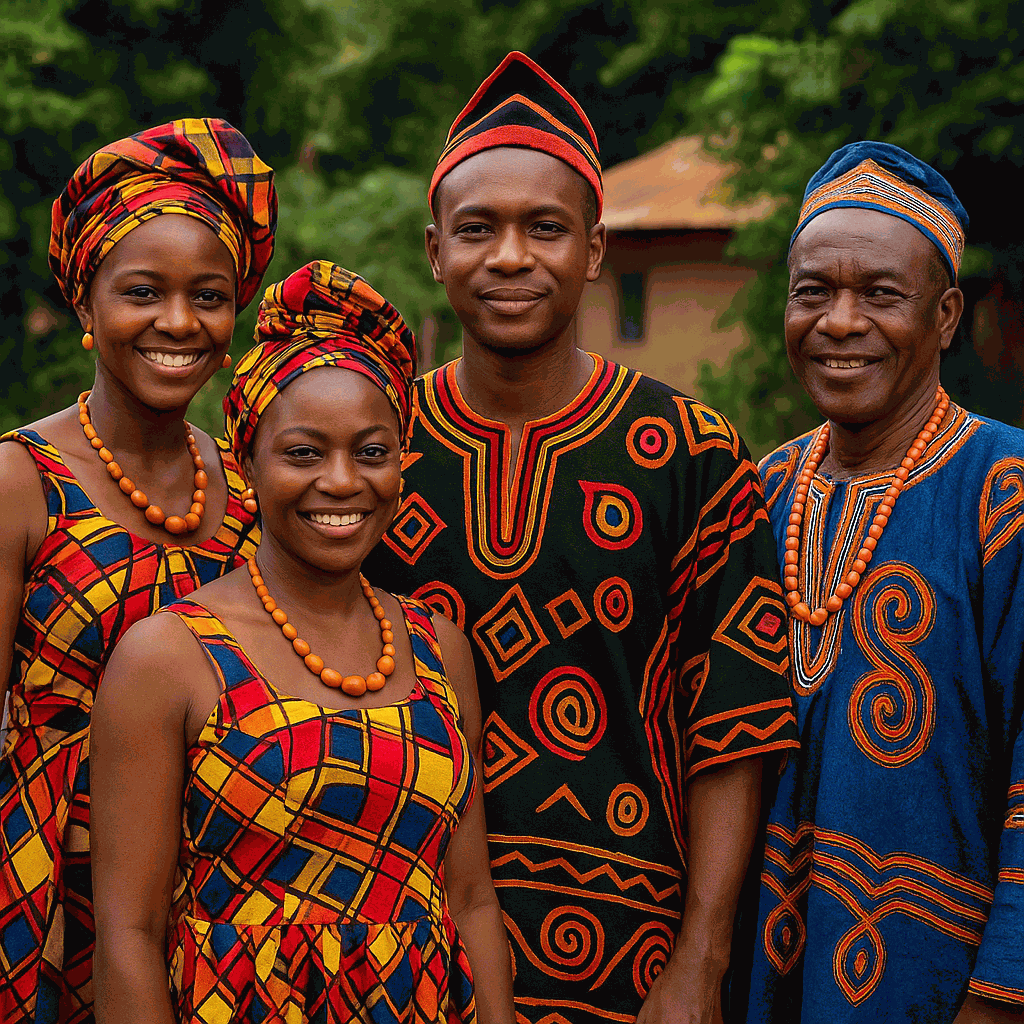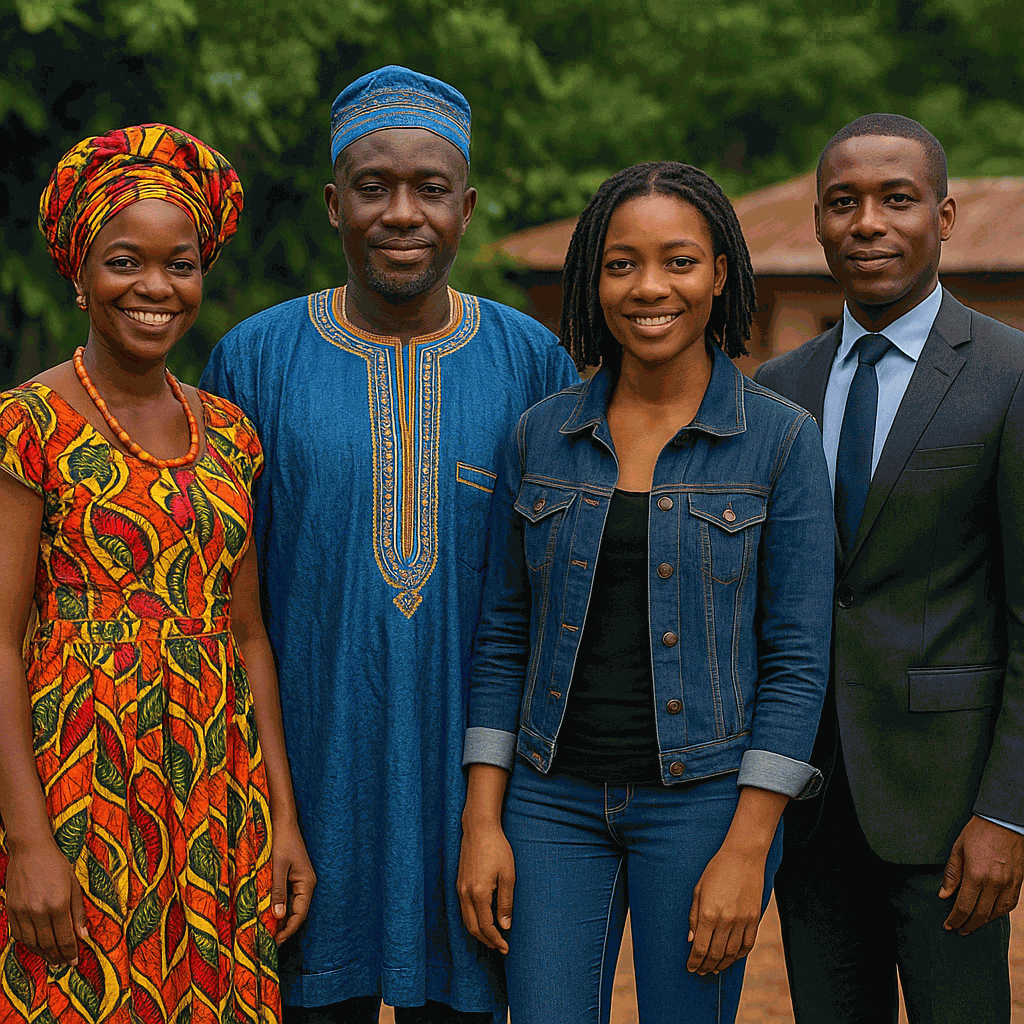Cultural Etiquette and Customs in Cameroon

For travelers to Cameroon, having a basic understanding of local customs and social norms can go a long way in creating positive and meaningful experiences. While traditions may differ slightly between Anglophone and Francophone regions—and even more so among the country’s 250+ ethnic groups—core values such as respect, hospitality, and communal harmony are widely shared. Greetings are highly valued, elders are shown particular reverence, and modesty in both dress and behavior is appreciated. By observing these cultural cues, visitors not only avoid misunderstandings but also build genuine connections with the people they meet.
Basic Rules: How to Show Good Manners in Cameroon
Cameroonian people follow a few important values in everyday life:
- Respect for Elders and Leaders: Older people, community elders, and those in charge—like officials or senior coworkers—are treated with great respect. It’s important to greet them properly, speak politely, and listen when they talk.
- Keeping Peace in the Group: People care a lot about getting along with others. Arguing in public or saying something that might embarrass someone is usually avoided. Staying friendly and respectful helps everyone feel comfortable.
- Being Patient and Polite: Things often take time in Cameroon, so being patient is important. Saying hello, smiling, and using polite words can really help when asking for help or talking to someone new.
How to Greet People Respectfully in Cameroon
In Cameroon, a proper greeting is non-negotiable and fundamental to initiating any interaction. Rushing into a request without a preliminary greeting is considered impolite.
- Handshakes: A firm handshake is the most common form of greeting. Men will typically shake hands with other men, and women with other women. For men greeting women, it's customary to wait for the woman to extend her hand first. In more formal settings or when greeting an elder, a slight bow or placing the left hand on the right forearm during the handshake shows extra respect. Be prepared for multiple, even repeated, handshakes within a group.
- Verbal Greetings: Always accompany a handshake with a verbal greeting. Common phrases include "Bonjour" (Good day - French) or "Good morning/afternoon/evening" (English). Learning a few greetings in local languages (e.g., "Mbol" in Duala, "Akiba" in Ewondo, "Salam Alaikum" in the North) will be highly appreciated. Inquire about a person's well-being, their family, or their day before moving on to your main purpose.
Why Elders Command Respect in Cameroonian Society
Respect for elders is a cornerstone of Cameroonian society across all ethnic groups. Elders are seen as repositories of wisdom, experience, and tradition.
- Deference: Show deference by listening attentively when elders speak, avoiding interrupting them, and using respectful language.
- Initiation: When entering a room, it's polite to greet the elders first. If you are standing, it's customary to remain standing until they sit or gesture for you to sit.
- Hierarchy: This respect extends beyond age to those in positions of authority or seniority, be it a traditional chief, a boss, or a senior colleague.
Understanding Hierarchy and Social Roles in Cameroonian Culture
Cameroonian society is largely hierarchical, with clear social roles and expectations.
- Traditional Authority: In many regions, traditional rulers (Fons, Lamidos, Chiefs) hold significant influence. Show respect for their position and the customs associated with their authority.
- Family Structure: The family unit is central, and respect flows from younger to older generations.
- Community: Actions are often viewed through the lens of how they affect the wider community, emphasizing collective well-being over individual desires. Understanding this collective spirit helps navigate social interactions.
Indirect Communication and the Art of Politeness in Cameroon
Cameroonian communication often prioritizes harmony and "saving face."
- Subtlety: People may avoid saying a direct "no" to soften potential disappointment or avoid confrontation. Phrases like "perhaps," "we'll see," or "it's difficult" might often imply a polite refusal. Pay close attention to tone, context, and follow-up actions (or lack thereof).
- Politeness: Politeness and deference are highly valued. Direct, aggressive, or overly assertive communication can be perceived negatively.
Common Body Language Gestures and What They Mean in Cameroon
Non-verbal cues are important in Cameroonian interactions.
- The Right Hand: Always use your right hand for handshakes, passing objects, eating, and gesturing. The left hand is generally considered unclean.
- Pointing: Avoid pointing with an index finger, as it's considered rude. Instead, gesture with an open hand or a slight nod of the head.
- Personal Space: Personal space is generally closer than in many Western cultures. Don't be surprised if people stand closer during conversations or touch your arm to emphasize a point.
- Head Nod: A quick, gentle nod, especially from an elder, can indicate acknowledgment or approval.
The Importance of Small Talk Before Business in Cameroon
Whether in a formal meeting or a casual encounter, jumping straight to business is often seen as abrupt or even rude.
- Building Rapport: Cameroonians value building personal relationships and trust before engaging in transactional matters.
- Patience: Be prepared to engage in pleasantries and general conversation about family, health, or general well-being for a few minutes before transitioning to your main purpose. This investment in small talk demonstrates respect and helps foster a positive relationship.
Do’s and Don’ts When Invited to a Cameroonian Home for a Meal
Being invited into a Cameroonian home is a sign of great warmth and hospitality.
|
Do’s |
Don’ts |
|
Greet Everyone Politely – Shake hands or use respectful greetings. |
Don’t Arrive Empty-Handed – It’s polite to bring a small gift (fruit, juice, etc.). |
|
Dress Neatly and Modestly – Appearance shows respect. |
Don’t Dress Too Casually or Flashily – Avoid beachwear, torn clothes, or excess jewelry. |
|
Wait to Be Seated – Let your host indicate where to sit. |
Don’t Rush to Sit or Serve Yourself – Wait for cues from the host. |
|
Wash Your Hands Before Eating – Often done with a basin or water jug. |
Don’t Skip Hand Washing – It’s part of the mealtime ritual, especially if eating with hands. |
|
Accept Food Graciously – Even a small taste is appreciated. |
Don’t Refuse Food Abruptly – If you must decline, do so politely. |
|
Eat With Your Right Hand (if using hands) – Left hand is considered impolite. |
Don’t Use Your Left Hand to Eat or Serve Others – It’s culturally disrespectful. |
|
Compliment the Food and Thank the Host – Even simple praise is appreciated. |
Don’t Criticize the Meal or Portions – It’s seen as rude and ungrateful. |
|
Engage in Light Conversation – Be warm and sociable. |
Don’t Discuss Politics or Controversial Topics – Keep conversations friendly. |
|
Offer to Help Clear or Thank the Host Again Before Leaving |
Don’t Leave Abruptly Without Proper Farewells – Goodbyes are important. |
How to Eat with Your Hands the Cameroonian Way
Many traditional Cameroonian dishes are eaten communally with the hands.
- Right Hand Only: This is the golden rule. Always use your right hand for eating. The left hand is considered unclean.
- Washing Hands: Before and after communal meals, a bowl of water will often be passed around for handwashing.
- Communal Dishes: Meals are often served in large communal dishes. Eat from the portion directly in front of you; do not reach across the dish or take food from others' sections.
- Wait for Elders: Always wait for the most senior person at the table to begin eating before you start.
- Finishing Food: While it's polite to appreciate the meal, finishing every last morsel might imply you didn't receive enough. Conversely, leaving too much can be seen as wasteful. Find a polite balance.
Regional Food Customs: From the Forest to the Sahel
Cameroon's culinary landscape is as diverse as its cultures.
- Coastal (Sawa): Known for seafood and dishes like Ndolé (a bitter leaf stew with nuts and meat/fish), often served with plantains or miondo (cassava stick).
- Grassfields (Bamileke, Bamoun): Features hearty stews and starches like achu (cocoyam paste) with yellow soup, or koki (bean cake). Fufu and Eru (a wild spinach stew) is also popular in the Anglophone regions.
- Forest (Beti): Famous for Bikutsi music and a staple of manioc (cassava) and spicy stews. Kati-Kati (chicken stew) is a common dish.
- Sahelian (North): Influenced by Islamic cultures, with dishes based on millet couscous served with various sauces (e.g., groundnut sauce), and grilled meats like brochettes.
Traditional vs. Modern Dress Etiquette in Cameroon

Cameroonians place great importance on personal appearance, and the way people dress often reflects a blend of tradition, cultural pride, and modern influence. Whether in the bustling cities or rural villages, dress serves as a form of expression and social respect. Understanding the difference between traditional and modern attire in Cameroon helps visitors navigate social situations with ease and cultural sensitivity.
Traditional Clothing in Cameroon
Traditional Cameroonian clothing is colorful, symbolic, and reflects regional identity. Women often wear pagne, a wax-print fabric styled into long dresses, skirts, and headscarves for ceremonies and events. Men in the north wear boubous and embroidered caps, while those in the Grassfields don ornate tunics and beaded accessories during celebrations.
Modern Clothing in Cameroon
In urban areas like Douala and Yaoundé, modern Western-style clothing is the norm. People dress smartly—suits, blouses, and dresses for work or formal events, while jeans, t-shirts, and sneakers dominate casual wear. Cameroonians often blend traditional fabrics with modern cuts for a distinctive, contemporary look.
What to Wear as a Tourist to Show Respect in Rural Areas
Modesty is key, especially in rural settings and conservative areas.
For Women:
- Cover Shoulders and Knees: Avoid short skirts, shorts, or revealing tops. Loose-fitting trousers, long skirts, or dresses are recommended.
- Head Covering: While not always mandatory, carrying a light scarf to cover your head when visiting religious sites or very conservative villages is a respectful gesture.
For Men:
- Trousers and Shirts: Trousers are generally preferred over shorts, especially when visiting communities or more formal settings. Collared shirts are always a good choice.
Avoid Bare Chests: Even in hot weather, refrain from going shirtless in public.
Respecting Religious Diversity in Cameroon: Islam, Christianity, and Traditional Beliefs
Cameroon is a melting pot of faiths, where Christianity (Catholicism and various Protestant denominations) and Islam are widely practiced alongside vibrant traditional indigenous beliefs.
- Tolerance: There's generally a high degree of religious tolerance, but it's important to be respectful of all faiths.
- Understanding Beliefs: Be aware that traditional beliefs often coexist with Christianity or Islam, influencing daily life and customs. For example, traditional healers might be consulted alongside modern doctors or religious leaders.
- Avoid Criticism: Do not criticize or make light of anyone's religious beliefs or practices.
Visiting Religious Sites in Cameroon: What You Should Know
Show appropriate respect when visiting places of worship.
- Modesty: Always dress modestly when visiting churches or mosques.
- Head Coverings (Mosques): Women should carry a head covering to wear when entering mosques.
- Shoes: Remove your shoes before entering a mosque.
- During Services: Avoid visiting during active prayer times unless you are invited to observe. If you do, be quiet and respectful.
Photography Etiquette: When to Ask for Permission

Always Ask First: This is the most crucial rule. Always ask for explicit permission before taking photos of individuals, especially children, or entering private property, including traditional compounds or villages. Some people may believe photography captures their spirit or use their image for ill intent.
Sensitive Sites:It is strictly prohibited and illegal to photograph government buildings, military installations, police officers, soldiers, or security checkpoints. These are often unmarked, so err on the side of caution. If in doubt, do not take the photo.
Topics to Avoid in Public Conversations in Cameroon
To maintain harmony and avoid potential offense, steer clear of certain subjects.
- Politics: The political landscape can be sensitive. Unless you know someone very well and they initiate the conversation, it's best to avoid discussing local politics, corruption, or governance.
- Religion: While religious diversity is celebrated, avoid questioning or criticizing anyone's specific religious beliefs.
- Ethnic Tensions: Do not comment on or ask about inter-ethnic relations or historical conflicts.
- Poverty: Avoid drawing undue attention to poverty or making generalizations about people's economic status.
Why Public Displays of Affection Are Frowned Upon in Some Regions
While generally tolerant, overt displays of affection (kissing, excessive hugging) between couples in public are often frowned upon, particularly outside of major cities and in more conservative areas. Holding hands is common for friends (same gender) and sometimes for couples.
Tips for First-Time Visitors to Cameroon
Cameroon's "Africa in Miniature" label means you will encounter a fantastic array of customs and languages.
- Be Observant: Pay attention to how locals behave and adapt your own actions accordingly.
- Learn Basic Phrases: Even a few words in French, English, or local dialects can go a long way in showing respect and fostering goodwill.
- Embrace Patience: Things may not always move at the pace you expect. A flexible attitude will make your experience more enjoyable.
- Engage with Locals: Cameroonians are generally warm and welcoming. Don't be afraid to strike up conversations, ask respectful questions, and learn directly from the people.
- Hire Local Guides: Especially when visiting traditional communities or remote areas, a local guide is invaluable for navigating cultural nuances and ensuring respectful interactions.
By embracing these cultural etiquettes and customs, visitors to Cameroon can forge deeper connections with its people, show respect for its rich heritage, and enjoy a truly authentic and rewarding journey through this remarkable nation. Your efforts to understand and adapt will be met with warmth, appreciation, and an even more memorable travel experience.
Disclaimer: While this information was last updated in January 2026, we strongly suggest confirming all travel details with the appropriate governmental agencies, embassies, and airlines.
Applying for a Cameroon eVisa
- Step 1: Complete the online application form with your personal details and passport information.
- Step 2: Proceed to securely pay online using your credit card.
- Step 3: Check your email for payment confirmation and receipt of your Cameroon eVisa, which will be sent electronically.



